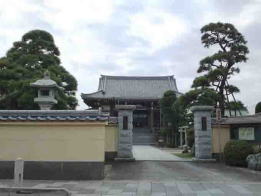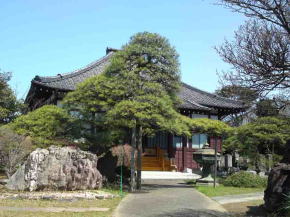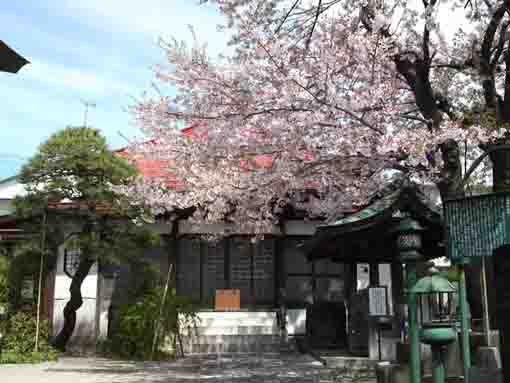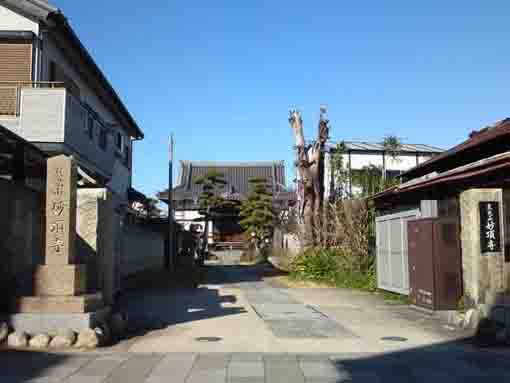Nakayama is in between Narita And Haneda International Airport
<クッキーについての同意並び欧州居住者向けプライバシーポリシー>
中山・下総・散歩道
Tokuganji Temple in Gyotoku
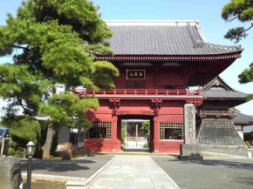

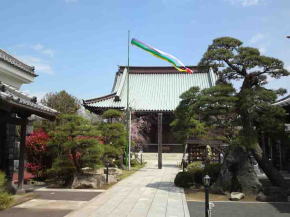
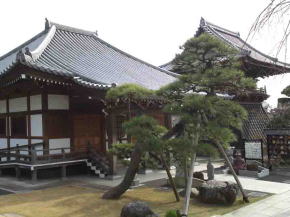
Tokuganji Temple with many beautiful pine trees standing at Teramachidori Road and Takumibori Canal is a famous temple having its long history and some stories deeply related to Tokugawa Shogun Family and the great samurai worrier Musashi Miyamoto. Ieyasu Tokugawa deeply believed this temple, his son Hidetada donated the statue of Buddha as the principal image of it, his grandson Iemitsu gave Shuin (a license) to hold lands and Musashi Miyamoto left his drawing and letters. The main gate, the bell tower and the scripture house built from late Edo period to Meiji era are designated as the municipal cultural properties of Ichikawa city. Moreover, Tokuganji Temple is the first temple of the 33 pilgrimages in Gyotoku and Urayasu.
Why don't you visit Tokuganji Temple?
The History of Tokuganji Temple
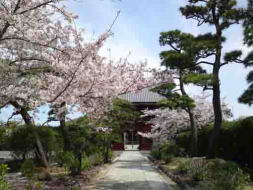
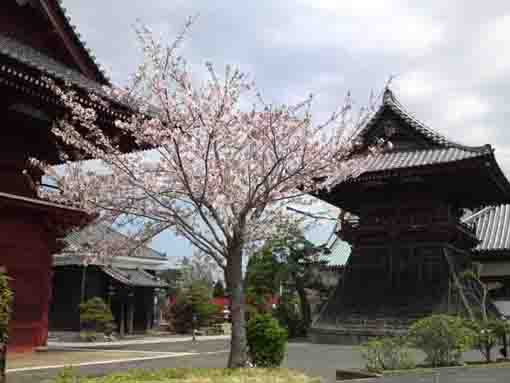
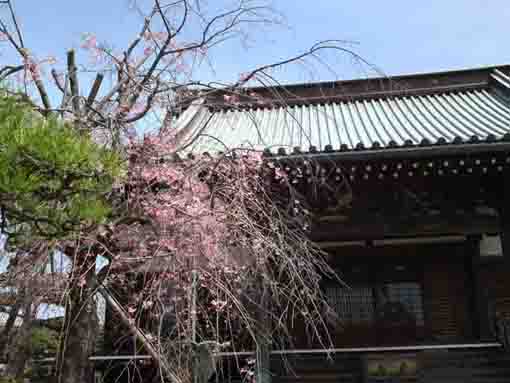
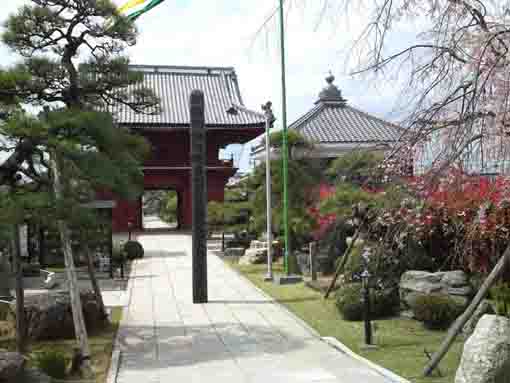
Kaigansan Tokuganji Temple
First Tokuganji Temple was a thatched hat called Fukoin, a branch temple of Shoganji Temple of Jodo sect of Buddhism. In 1610, Ieyasu Tokugawa, the founder of Tokugawa Shogunate in Edo, deeply believed in and built some new buildings, then the temple's name was changed Tokuganji it was named after Toku from Tokugawa and Gan from Shoganji. And the venerable Enyo Fuzan became the founder of Tokuganji Temple.The principal image of Tokuganji is the statue of Amidanyorai (Amitabha Tahagata) that was carved by Unkei by the order of Masako Hojo who was the wife of Yoritomo Minamoto, once Ieyasu moved it from Kamakura to Edo for the wife of his son Hidetada, the second Shogun. After she had passed away, the venerable Chuzan, the second abbot of this temple, kept to take care of it as the principal image. Then, Iemitsu, the third Shogun, gave the Shuin to keep lands to look after the statue carefully.
The main hall of the temple was burnt down in 1856, then it was built again in 1916. Nevertheless, the statues of Nio (Deva Kings) in the main gate was moved from Hozenji Temple that was Betto (the adminstrator) of Katsushika Hachimangu Shrine in Yawata during the Meiji Restoration. Moreover, Rindo Style Kyozo (the rotating sutra repository) and Migawari Kannondo Hall (the hall for the vicariousness kannon) are there in Tokuganji Temple. And the statue of the Great King Yama (Emma) carved by Tankei is dedicated in the main hall.
In addition, the memorial pagoda for the repose of drawn people by the Eitaibashi in Fukagawa Edo fallen down in 1807 and a stone jizo for the consolation of Musashi Miyamoto stand in the temple. And also some calligraphy by Musashi and a picture of a ghost by Okyo Maruyama are presrved as the properties of the temple.
Once Tokuganji Temple was used as the temporary office of Inba Prifectural Government (former Chiba prefecture) in December 1871. And also the Gyotoku Elementary School was opened in a temporary buildings using some buildings in this temple in 1873.
昭和54年3月
市川市教育員会
The Noted Cultural Properties in Tokuganji Temple
The main gate, the sutra repository and the bell tower are designated by Ichikawa City as the cultural properties. And the stone jizo for the consolation of Musashi Miyamoto stands in the temple. Moreover, some famous properties a picture of Dharma by Musashi and a picture of a ghost by Okyo Maruyama are exhibited in the Otoya of November 16th every year.The Sanmon Gate of Tokuganji Temple

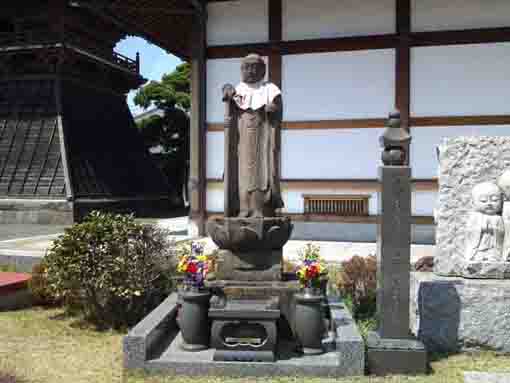
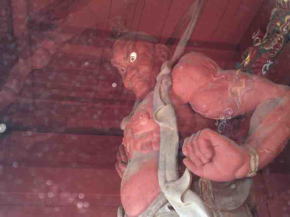
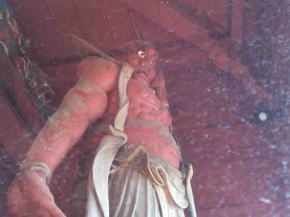
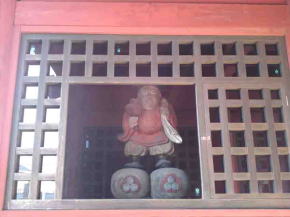
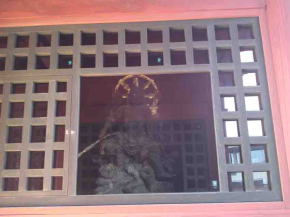
The Sanmon Gate
The Sanmon Gate at Tokuganji Temple was built in 1775.This gate was used a basic way of building the tower gate style. It is the middle size gate, and it measures 8.44m length and 5.18m width. It is a typical tower gate built in the middle of Edo period and there is any omitting the structure. The noted works on the gate is the sculptures on it. They were carved in mid-Edo period by sculptors from Edo even in Shimousa.
In addition, the Deva Kings in the gate were moved from the Zuishinmon Gate in Katsushika Hachimangu Shrine in Yawata to protect them from the law of the separation of Buddhism and Shintoisma and the anti-Buddhist movement soon after the Meiji Restoration.
The Rotating Sutra Repository of Tokuganji Temple
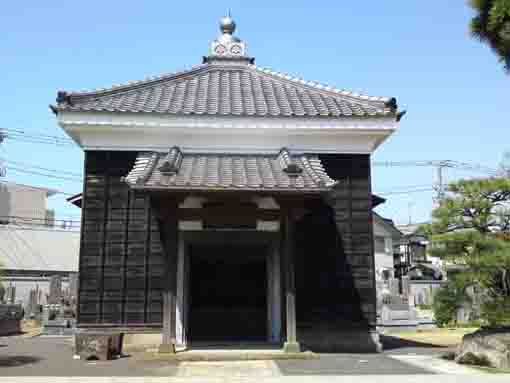
The Rotating Sutra Repository
The rotating sutra repository in Tokuganji temple was built in 1887. There is a a rotating octagonal hall storing Issaikyo (complete collection of Scriptures) in it. The size of it measures 5.46m length and 5.46m width. It was built in the godown style with wooden wall on its lower part. The rotating hall could be round and the wooden eaves with some scruptures are very functional and shows the typical carving techniques in Meiji era. Though it was built in Meiji ear, the rotating style is very precious and rare.The Bell Tower of Tokuganji Temple
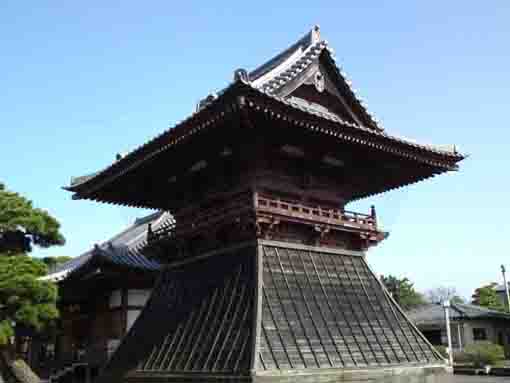
The Bell Tower
The bell tower in Tokuganji Temple was built in1775, it is the almost similar ages when the sanmon gate was built in.The bell tower is built in the basic style, the size in the second floor measures 4.02m length and 3.2m width, and it on the base measures 7.47m length and 6.77m width. There is any omitting the structure so it is a typical middle size and bell tower. Moreover, the sculptures on the tower were carved more deeply than they are on the sanmon gate, and the expressions on them were also exaggerated, so the date and sculptors of the tower might be different from the gate.
Joya no Kane (the bell ringing out the old year) ring out from the Bell Tower in Tokuganji Temple at the last night of every year.
The Stone Jizo for the Consolation of Musashi Miyamoto

The Stone Jizo for the Consolation of Musashi Miyamoto in Tokuganji
There is a legend that he first met a boy having lost his father named Iori (later he became his son in law) at Fujiwara in Funabashi city where Fujiwara Kannondo hall that Tokuganji Temple hold stands when Musashi Miyamoto went on the Hitachiji way to Edo after his trip around Ouu legion (the northern part of Japan). Moreover, according to Katsushikashiryaku, Musashi was died at Myoden in Gyotoku. Anyway, the samurai worrier Musashi Miyamoto visited Tokuganji Temple in Hongyotoku that Ieyasu Tokugawa had believed in. The legend of Musashi Miyamoto was told in Gyotoku area from generation to generation as the memorial tower for the consolation of him stands in Tokuganji Temple.引用、抜粋並びに参考
海厳山徳願寺前案内板
市川市ホームページ
船橋市ホームページ
市川市市立図書館ホームページ
葛飾八幡宮内御由緒書
葛飾八幡宮随神門前案内板
藤原観音堂前案内板
江戸名所図会6 ちくま学芸文庫
房総叢書 紀元二千六百年記念 第8卷葛飾紀
房総叢書 紀元二千六百年記念 第6卷葛飾誌略
市川よみうり 2015年1月10日号
ウィッキペディア
The Temples of the 33 Pilgrimage in Gyotoku & Urayasu
The list of the temples of the 33 Pilgrimages in Gyotoku and Urayasu
- 01 Tokuganji : 5-22 Hongyotoku Ichikawa-shi
- 02 Fukusenji :2-7 Futamata Ichikawa-shi
- 03 Choshoji : 8-5 Hongyotoku Ichikawa-shi
- 04 Jishoin : 1-10 Hongyotoku Ichikawa-shi
- 05 Daitokuji : 5-13 Shimonijuku Ichikawa-shi
- 06 Jorinji (abandoned) : around Kawara Ichikawa-shi
- 07 Shogenji : 3-6 Kawara Ichikawa-shi
- 08 Yofukuin : 5-16 Kawara Ichikawa-shi
- 09 Ryugonji (Sorinji) : 3-10-2 Tokagi Ichikawa-shi
- 10 Fukuoji (Sorinji) : 3-10-2 Tokagi Ichikawa-shi
- 11 Ryogokuji : 2-16-4 Koya Ichikawa-shi
- 12 Anyoji : 2-16-35 Koya Ichikawa-shi
- 13 Hosenji : 7-22 Hongyotoku Ichikawa-shi
- 14 Hozenji : 1-25 Honshio Ichikawa-shi
- 15 Jokanji : 23-24 Hongyotoku Ichikawa-shi
- 16 Shingyoji (Kyoshinji) : 38-18 Hongyotoku Ichikawa-shi
- 17 Kyozenji (Kyoshinji) : 38-18 Hongyotoku Ichikawa-shi
- 18 Hoshoji (abandoned) : now brought into 19 Tokuzoji
- 19 Tokuzoji : 8-10 Sekigashima Ichikawa-shi
- 20 Seiganji : 4-8 Oshikiri Ichikawa-shi
- 21 Korinji : 12-20 Oshikiri Ichikawa-shi
- 22 Hodenji : 7-1 Minato Ichikawa-shi
- 23 Enmyoin : 11-21 Minato Ichikawa-shi
- 24 Zenshoji : 18-20 Minato Ichikawa-shi
- 25 Genshinji : 1-16-26 Katori Ichikawa-shi
- 26 Ryozenji : 2-12-18 Ainokawa Ichikawa-shi
- 27 Shinseiji : 1-9-1 Arai Ichiakawa-shi
- 28 Enmeiji : 1-9-2 Arai Ichikawa-shi
- 29 Zenpukuji : 26-27 Todaijima Urayasu-shi
- 30 Kezoin : 3-10-3 Nekozane Urayasu-shi
- 31 Togakuji : 2-4-27 Horie Urayasu-shi
- 32 Hojoin : 4-14-1 Horie Urayasu-shi
- 33 Dairenji : 4-14-2 Horie Urayasu-shi
- extra Fujiwara Kannondo Hall 2-234 Fujiwara-cho Funabashi-shi
* Please ask some specific information in each temple.
Why don't you visit the 33 Temples on this movie?
This movie is a slideshow created by some pictures of the temples. Why don't you watch it?
The Location and Access to Tokuganji Temple
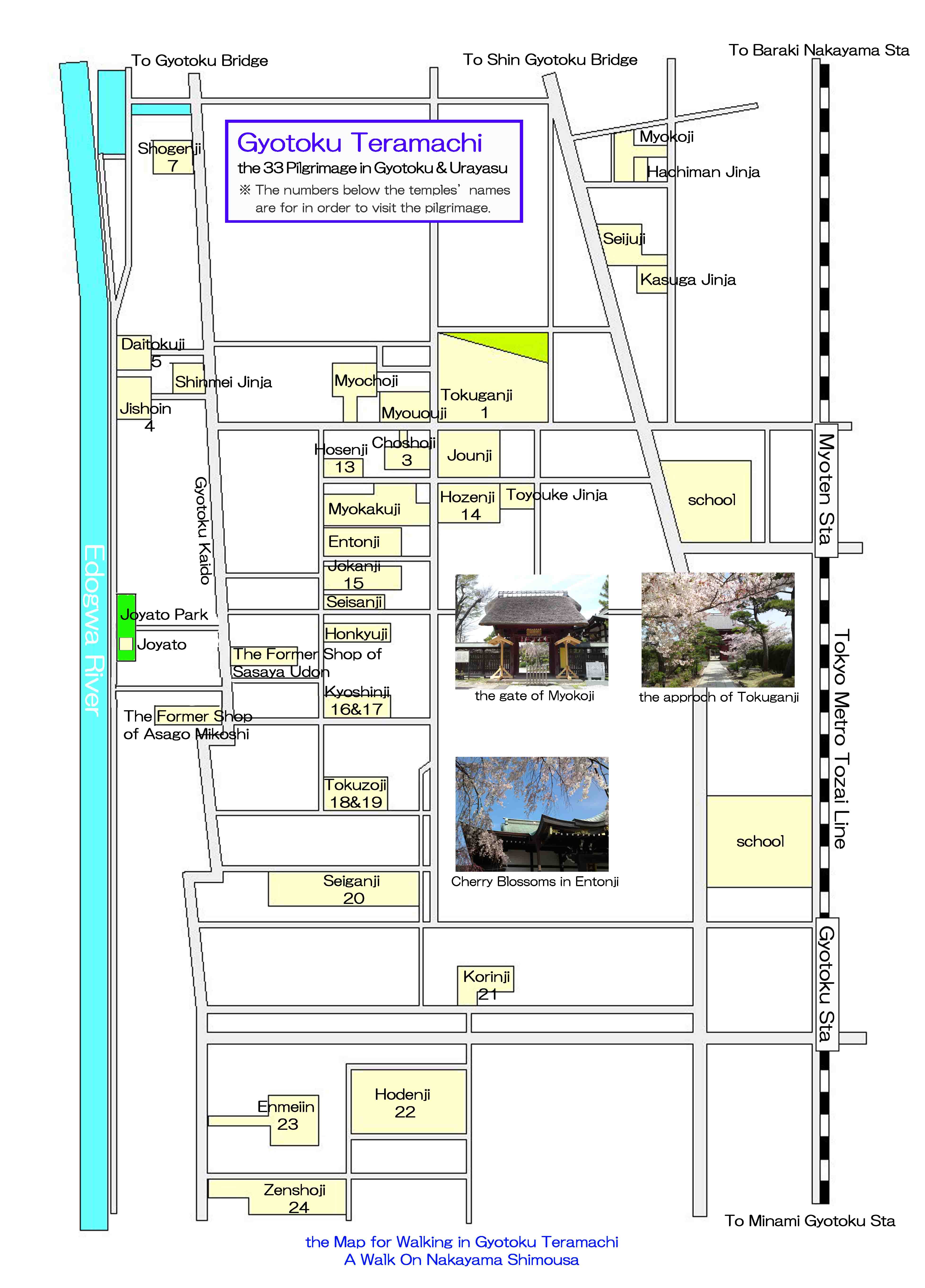
The map of the noted spots in Gyotoku Teramachi Areas
PDF of the Map of the landmarks in Gyotoku Teramachi AreasKaigansan Tokuganji Temple
- Tokuganji Temple has a great accessibility from both Narita and Haneda International Airport.
- From Narita International Airport, take JR Sobu-express line, transfer the line at Nishi-funabashi to Tozai line of Tokyo Metro bound to Nakano or Mitaka, get off Myoden Sta. And also take Keisei-line, transfer the line at Funabashi to Sobu-Local line, and transfer the line at Nishi-funabashi to Tozai line of Tokyo Metro bound to Nakano or Mitaka, get off Myoden Sta. It takes minimally 60 minutes from Narita Airport.
- From Haneda International Airport, take Keikyu-line bound to Narita, transfer the line at Nihonbashi to Tozai line of Tokyo Metro bound to Nishifunabashi, Tsudanuma or Katsutadai, get off Myoden Sta.
- From Tokyo (Otemachi) Sta, take Tozai line of Tokyo Metro bound to Nishi-funabashi, Tsudanuma or Katsutadai, get off Myoden Sta.
- From Akihabara Sta, take Sobu line bound to Chiba, Tsudanuma or Nishi Funabashi, transfer the line at Nishifunabashi to Tozai line of Tokyo Metro, get off Myoden Sta.
- Take 10 minute walk from Myoden Sta.
- 5-22 Hongyotoku, Ichikawa-shi, Chiba-ken
The Noted Spots near Tokuganji Temple

Tokuganji Temple
- 広告 Advertisement -
